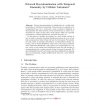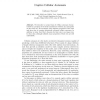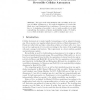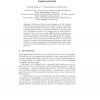119
Voted
ACRI
2010
Springer
15 years 2 months ago
2010
Springer
Abstract. Network decontamination (or disinfection) is a widely studied problem in distributed computing. Network sites are assumed to be contaminated (e.g., by a virus) and a team...
CORR
2008
Springer
15 years 2 months ago
2008
Springer
The goal of this paper is to show why the framework of communication complexity seems suitable for the study of cellular automata. Researchers have tackled different algorithmic p...
CORR
2008
Springer
15 years 2 months ago
2008
Springer
Abstract. We introduce a natural class of cellular automata characterised by a property of the local transition law without any assumption on the states set. We investigate some al...
ACRI
2008
Springer
15 years 2 months ago
2008
Springer
Cellular automata are usually updated synchronously and thus deterministically. The question of stochastic dynamics arises in the development of cellular automata resistant to nois...
126
click to vote
IFIPTCS
2000
15 years 4 months ago
2000
The capabilities of alternating cellular automata (ACA) to accept formal languages are investigated. Several notions of alternation in cellular automata have been proposed. Here we...
ACSC
2004
IEEE
15 years 4 months ago
2004
IEEE
The study of self-replicating structures in Computer Science has been taking place for more than half a century, motivated by the desire to understand the fundamental principles a...
112
Voted
STACS
1997
Springer
15 years 4 months ago
1997
Springer
Abstract. This paper deals with simulation and reversibility in the context of Cellular Automata (ca). We recall the de nitions of ca and of the Block (bca) and Partitioned (pca) s...
139
Voted
PKC
1998
Springer
15 years 4 months ago
1998
Springer
One-way hash functions are an important tool in achieving authentication and data integrity. The aim of this paper is to propose a novel one-way hash function based on cellular aut...
ACRI
2000
Springer
15 years 4 months ago
2000
Springer
This paper describes the first impressions of the development of a multi-agent system that can be used for visualising simulated pedestrian activity and behaviour to support the a...
116
click to vote
IPPS
2000
IEEE
15 years 4 months ago
2000
IEEE
Cellular automata can be used to design high-performance natural solvers on parallel computers. This paper describes the development of applications using CARPET, a high-level prog...




